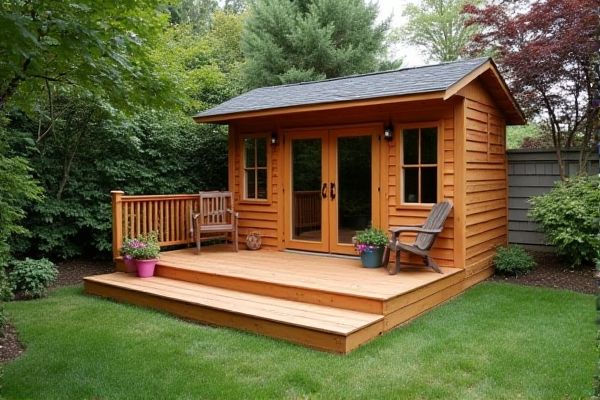
A deck box provides a compact, weather-resistant solution for storing outdoor items like cushions and garden tools, while a storage shed offers larger capacity and more robust protection for bulky equipment and seasonal items. Discover which option best suits your outdoor organization needs by reading the rest of the article.
Table of Comparison
| Feature | Deck Box | Storage Shed |
|---|---|---|
| Size | Small to Medium (typically 30-100 gallons capacity) | Large (can range from 50 to 500+ square feet) |
| Portability | Lightweight, movable | Fixed installation, not portable |
| Usage | Outdoor furniture storage (cushions, tools, toys) | Comprehensive storage (lawn equipment, tools, bikes) |
| Material | Plastic, Resin, Wood | Wood, Metal, Plastic |
| Installation | No installation required | Requires assembly and anchoring |
| Cost | Low to Moderate ($50-$300) | Moderate to High ($200-$3000+) |
| Weather Resistance | Generally water-resistant, limited insulation | Weatherproof, better insulation options |
| Security | Basic lock options | Advanced locking mechanisms, higher security |
Introduction to Deck Boxes and Storage Sheds
Deck boxes and storage sheds both provide effective outdoor storage solutions but differ in size, materials, and functionality. Deck boxes are typically made of weather-resistant plastic or resin, offering compact storage ideal for garden tools, cushions, and small outdoor accessories. Storage sheds, often constructed from wood, metal, or heavy-duty plastic, provide larger capacity and more durable shelter suited for bulky equipment, bicycles, and seasonal items.
Key Differences Between Deck Boxes and Storage Sheds
Deck boxes provide compact, weather-resistant storage for outdoor cushions, gardening tools, and small equipment, making them ideal for patios and decks. Storage sheds offer larger capacity and more robust construction, serving as a dedicated space for bulky items such as lawnmowers, bicycles, and seasonal gear. Your choice depends on the volume of items and the level of protection you need from the elements.
Space and Capacity Comparison
Deck boxes typically offer limited storage space ranging from 30 to 90 gallons, suitable for small outdoor items like cushions, gardening tools, and pool accessories. Storage sheds provide significantly larger capacity, often exceeding 100 square feet, accommodating bulky equipment such as lawnmowers, bicycles, and seasonal furniture. The choice between a deck box and a storage shed depends on the volume and size of items needing storage, with sheds offering greater versatility for extensive storage needs.
Material and Durability Considerations
Deck boxes are typically made from weather-resistant resin or plastic, offering lightweight durability and requiring minimal maintenance, making them ideal for storing outdoor cushions and small garden tools. Storage sheds, constructed from materials like metal, wood, or heavy-duty plastic, provide superior strength and protection against harsh weather conditions, suitable for larger items and long-term storage. Your choice depends on the level of durability you need and the types of items you intend to protect.
Ease of Installation and Maintenance
Deck boxes offer simple installation, often requiring no tools and minimal assembly, making them ideal for quick setup with little effort or skill. Storage sheds, on the other hand, typically demand more complex construction involving foundational preparation and assembly, increasing both installation time and maintenance needs. Your choice depends on whether you prioritize quick, low-maintenance solutions (deck box) or larger, more durable storage options despite higher installation demands (storage shed).
Security and Weather Protection
Deck boxes provide moderate security and weather protection with lockable lids and durable, weather-resistant materials that safeguard garden tools from rain and UV damage. Storage sheds offer enhanced security features such as reinforced doors, padlocks, and alarm systems, along with superior weather protection through solid roofing, heavy-duty walls, and ventilation to prevent moisture buildup. Choosing between a deck box and a storage shed depends on the required level of security and the severity of weather conditions in your area.
Aesthetic Appeal and Design Options
Deck boxes offer a sleek, compact design that easily complements outdoor furniture and enhance your deck's aesthetic appeal with materials like resin, wood, or metal. Storage sheds provide greater customization options, including various sizes, colors, and architectural styles to match your home's exterior while maximizing storage capacity. Your choice depends on whether you prioritize seamless integration with deck decor or extensive design flexibility.
Cost Analysis and Budget Factors
Deck boxes offer a budget-friendly storage solution with lower upfront costs, typically ranging from $100 to $400, making them ideal for smaller storage needs. Storage sheds require a higher initial investment, often between $700 and $3,000 depending on size and materials, but provide greater durability and capacity for long-term use. You should consider both immediate expenses and future maintenance when analyzing cost factors for your outdoor storage project.
Best Uses for Deck Boxes vs Storage Sheds
Deck boxes are ideal for storing outdoor cushions, gardening tools, and pool accessories in compact spaces, providing weather-resistant, easily accessible storage on decks or patios. Storage sheds offer larger capacity for housing lawn equipment, bicycles, seasonal items, and bulkier tools, protecting contents with robust construction suitable for extended outdoor exposure. Selecting between a deck box and storage shed depends on storage volume needs, available space, and the types of items to be organized.
How to Choose: Deck Box or Storage Shed?
Choosing between a deck box and storage shed depends on your available space, storage needs, and budget. Deck boxes offer compact, weather-resistant storage ideal for smaller items and limited outdoor areas, while storage sheds provide larger capacity and enhanced organizational options for bulky tools or garden equipment. Assess your specific storage requirements and space constraints to determine which solution best protects your belongings and complements your outdoor setup.
 homyna.com
homyna.com